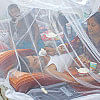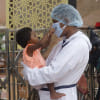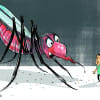Dengue takes alarming turn

The dengue situation in the country is getting worse this year as the number of infected people has more than doubled since last month, compared with the same period last year.
According to a report of Directorate General of Health Services (DGHS), 155 people were infected with dengue last month and 586 more till the 23rd of this month. However, the number was 52 in May and 295 in June last year.
Experts said climate change effects, intermittent rain, pattern of weather and lack of cleanliness were the main reasons for this increase in dengue cases.
A total of 10,148 people were infected with dengue last year and 26 of them died. It was a record for the number of dengue cases in a year. The previous highest was 6,232 in 2002.
A survey by DGHS found high presence of Aedes mosquito in the capital.
The communicable diseases wing of the DGHS conducted the survey from March 3-12. It surveyed water samples collected from 998 houses at 100 places under 97 wards of two city corporations in Dhaka.
The survey found high level of larvae of Aedes mosquito in water collected from abandoned tyres, plastic drums, buckets, open tanks in under-construction buildings and flower tubs.
According to the survey, the density of mosquito larvae in water was high in wards 35, 1, 4, 19, 20, 16, 22, and 23 of Dhaka North City Corporation (DNCC) and wards 41, 12, 17, 4, 39, 6, 7, 14, 19, 20, 21, 22, 43, 47 and 48 of Dhaka South City Corporation (DSCC).
Meanwhile, Health and Family Welfare Minister Zahed Malik yesterday said 853 people were infected with dengue in the country so far this year.
But the number of deaths was still low compared to some other neighbouring countries like Malaysia, the Philippines, Thailand, Myanmar and India.
This year, two people died of dengue fever in the capital in April.
Speaking at a press conference at his ministry office, the health minister said they were taking steps, including providing training to doctors and nurses on dengue patient management, as they did not want any death from dengue fever.
Zahed said they asked all city corporations and municipalities to take necessary steps to destroy the breeding grounds of Aedes mosquitoes and also provided training to 1,500 doctors and nurses on proper management of dengue patients.
He said the ministry distributed kits among the city corporations to test blood for dengue.
Dr Sanya Tahmina, line director (communicable disease control) of DGHS, said it is very important to destroy the source of Aedes mosquitoes to reduce the number of patients.
She said they were thinking of bringing from abroad a type of laboratory-born mosquito called “Ulbakia” which would reduce the number of Aedes mosquito.
The male mosquito is infected with a virus and when it mates with a female, the female loses its breeding capacity, Sanya added.
The DGHS official said a working group was formed for the Ulbakia project at the end of last year and they were working on how the mosquito would be brought to the country and what could be its impacts.
She said dengue fever in Bangladesh is now an endemic disease, meaning it will remain in the country throughout the year.
DSCC Chief Health Officer Brig Gen Sharif Ahmed and his counterpart in DNCC Brig Gen Md Mominur Rahman Mamun said they were taking different steps, including building awareness among the people, and giving more emphasis on larviciding and adulticiding to keep dengue cases in check.

 For all latest news, follow The Daily Star's Google News channel.
For all latest news, follow The Daily Star's Google News channel. 








Comments